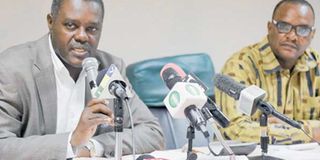Hope as Magufuli activates rights commission

Former chairman of the Tanzania Commission for Human Rights and Good Governance, Tom Nyanduga speaks at a past event. Left is Udsm Law Lecturer, James Jesse. President Magufuli presided over the swearing in of new commissioners on November 4. PHOTO | FILE
Since 2017 rights activists were calling on President John Magufuli to replace the retired chairperson and commissioners of the Commission for Human Rights and Good Governance (CHRGG), saying making the commission operational will bear witness to the Head of State’s commitment to upholding human rights and rule of law principles.
After having stayed without a chairperson since November 2017, CHRGG’s secretariat finally invited public comments on the candidates it had shortlisted for an interview in May this year.
Four months later, in September 2019, Mr Magufuli appointed a new chairperson, deputy-chairperson and commissioners. The development raised hope among those who were concerned. They were officially sworn-in on Monday, November 04, 2019.
Since the stepping down of the former chairman, retired judge Bahame Tom Nyanduga and his commissioners, the CHRGG remained inactive, making many of its tasks taken over by independent rights organisations which have placed the Magufuli administration under intense criticism for the alleged failures to uphold the principles of human rights and rule of law principles.
After swearing in the new commission’s leadership, President Magufuli asked the officials to go and help people whose rights are violated. Going by the recent events, it appears that the commission will be restless to work on people’s complaints.
Repressive laws
The latest of these criticisms have come from Amnesty International and Human Rights Watch which through their reports launched on October 28, 2019 from Kenya’s capital Nairobi accused the government of applying a raft of repressive laws, restricting the rights of opposition politicians, human rights defenders, activists, researchers, journalists, bloggers and other online users.
Justice and Constitution Affairs minister Augustine Mahiga is yet to issue a response on the reports despite promising to do so. The two organisations say that the application of various laws has had a chilling effect on the rights to freedom of expression, association and peaceful assembly, with people’s censoring actions perceived as critical of the government for fear of prosecution or other reprisals.
“As President Magufuli marks four years in office [in November], he must carefully reflect on his government’s record of ruthlessly disembowelling the country’s human rights framework,” said Mr Roland Ebole, Amnesty International’s Tanzania researcher.
“[President Magufuli’s] government must repeal all oppressive laws being used to clamp down on dissent, and urgently end human rights violations and abuses.”
Rights activists think that if the CHRGG was operational, it would have pressurised the government to lift the ban on political activities.
Other concerning incidents include frequent anti-human rights statements made by senior government officials which are often followed by cracking down on individuals and organisations.
The activists are also concerned with the rhetoric, often coupled with arbitrary arrests and threats to deregister nongovernmental groups, which they think has stifled independent reporting by journalists and public discussion on human rights violations and abuses including in the context of the upcoming elections.
“Tanzania should show true commitment to protecting and fulfilling the rights to freedom of expression and association,” said Oryem Nyeko, Africa researcher at Human Rights Watch. “The authorities need to put a stop to harassment, intimidation, and arbitrary arrests of activists, journalists, and opposition members.”
Wide-ranging restrictions
The passing of various legislations that in one way or the other seem to stifle the country’s civic space is also a matter of concern to many who work in the country’s human rights and rule of law issues.
These laws include the amendment of the Political Parties Act which is said to usher in wide-ranging restrictions on the rights to freedom of association and peaceful assembly.
Restrictions on media freedom are also said to have intensified under the 2016 Media Services Act which enhances censorship violates the right to information and limits scrutiny of government policies and programmes.
Between 2016 and 2019, human rights reports show that the government used the law to close, fine and suspend at least six media outlets for publishing reports on allegations of corruption and human rights violations and the state of Tanzania’s economy.
Since 2018, the government also brought in sweeping powers to police the internet. The Electronic Postal Communications (Online Content) Regulations enacted in March 2018 broadly restricts online content, requires bloggers to register and permit surveillance of cybercafés without judicial oversight.
Together with 2015 Cybercrimes Act, which criminalizes the publication of “false” information, these laws undermine the privacy of internet users and stifle freedom of expression.
Commenting on the situation of human rights and the rule of law in the country, one political analyst, speaking on the condition of anonymity was of the views that there is a notable improvement in the way the administration has fared in the field.
“Objectively, the situation has improved on the ground and this implies that the authorities have been taking notice of the concerns raised and responded to them somehow.
Even these latest reports [by Human Rights Watch and Amnesty International], the administration may pretend not to care but surely it does,” said the senior political analyst in one of the European country’s embassies in the country.




